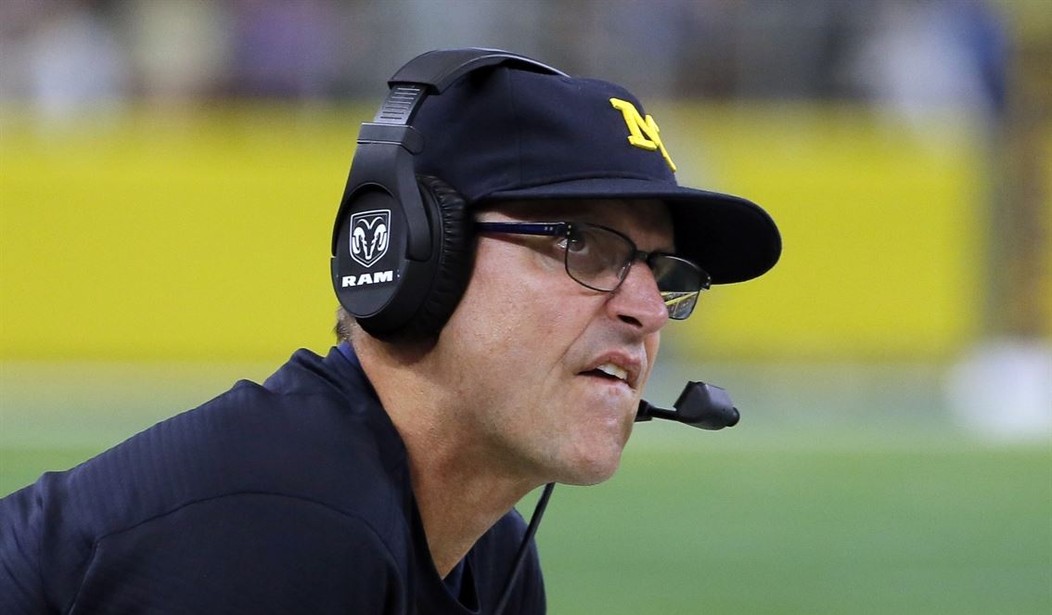We’re just over halfway through the 2023 college football season, and the sports media has made its narratives clear all season long. Even though media outlets like ESPN have allowed shiny things like Colorado, Oklahoma, and Washington to catch their eyes, the consensus all year long is that Michigan is going to be a championship contender.
The Michigan Wolverines have found themselves embroiled in a scandal that is giving them press for the wrong reasons. Allegations of sign-stealing have arisen just as the Wolverines face a spate of games against tough rivals. The NCAA notified upcoming opponents, including Michigan State, Penn State, and Ohio State of the investigation.
“The NCAA is investigating Michigan ‘over possible rule-breaking around in-person scouting of opponents,’ according to an industry source briefed on the matter,” reports Brendan Quinn at The Athletic. “According to NCAA Bylaw 11.6.1, off-campus, in-person scouting of future opponents (in the same season) is prohibited. An issue with the bylaw would mean a case that would likely proceed through the traditional infractions process.”
“U-M Athletics will offer its complete cooperation to the NCAA in this matter,” Michigan Athletic Director Warde Manuel announced in a statement. “At the University of Michigan, all of us are committed to the highest standards of ethics and integrity for all members of our community. This is the same expectation I have of all coaches, staff, and student-athletes.”
ESPN reports that Connor Stalions, a retired Marine and Wolverines football analyst, is the target of the investigation. Stalions is so central to the investigation that the NCAA has demanded access to his computer. Sources told ESPN that the sign-stealing dates back at least as far as 2021.
Head coach Jim Harbaugh issued a statement denying any knowledge of the scheme, saying, “I do not have any knowledge or information regarding the University of Michigan football program illegally stealing signals, nor have I directed any staff member or others to participate in an off-campus scouting assignment.”
Related: NCAA Announces New Penalties for Student-Athletes Who Break Gambling Rules
It’s not the only scandal plaguing the Michigan football program right now. Harbaugh and his staff are also dealing with alleged recruiting violations, so these latest accusations are distraction on top of distraction.
“With the ongoing NCAA investigation into Michigan recruiting and coach Jim Harbaugh potentially facing additional penalties there, this separate investigation could significantly increase his exposure to additional suspension,” reports ESPN.
What could this mean for Harbaugh and the Wolverines? The school negotiated a three-game suspension for the coach at the beginning of the season, but these latest allegations could put even harsher penalties on the athletic program.
ESPN’s Mark Schlabach and Adam Rittenberg explain:
Harbaugh already faces NCAA charges of failure to cooperate and head coach responsibility related to recruiting violations committed during the COVID-19 dead period. Another violation by a member of his coaching staff could trigger another charge of head coach responsibility, which could potentially be a Level I violation. According to NCAA bylaw 19.12.5.1: “An institution shall be considered a repeat violator if the Committee on Infractions finds that a Level I or Level II violation has occurred within five years of the starting date of a Level I or Level II penalty stemming from a previous case.” Because the NCAA has not ruled on Michigan’s Level II violations case, stemming from alleged recruiting infractions during the COVID-19 dead period, the school and potentially Harbaugh could be deemed repeat violators.
The NCAA Committee on Infractions rejected a four-game negotiated suspension for Harbaugh in the recruiting case, and Michigan self-imposed a three-game suspension. With that case still needing to be resolved, an additional head coach responsibility charge based on alleged signal stealing would significantly increase his exposure to additional punishment, including a longer suspension.
The NCAA’s committee on infractions would not need to render its decision on the initial case for the repeat violator provision to be enacted. The infractions committee is not expected to make its decision on the first case until 2024.
The sign-stealing allegations could also force Michigan to vacate some of its wins or face other harsh penalties.
“Sources told ESPN that the NCAA is investigating allegations that stem from before the 2023 season, so impacted games that Michigan won could be vacated,” Schlabach and Rittenberg write. “Other possible penalties include postseason bans, scholarship reductions, fines, and coaching restrictions (game suspensions and off-campus recruiting privileges) for those who are implicated.”
Sign-stealing is not without precedent. MLB’s Houston Astros and the NFL’s New England Patriots had sign-stealing scandals of their own, but sources claim that this is a much bigger deal.
“This is worse than both the Astros and the Patriots — it’s both use of technology for a competitive advantage and there’s allegations that they are filming prior games, not just in-game,” a Big Ten source told ESPN. “If it was just an in-game situation, that’s different. Going and filming somewhere you’re not supposed to be. It’s illegal. It’s too much of an advantage.”
If the NCAA finds evidence that Michigan stole signs from other teams, this could rock the program, and the ripples could echo throughout college football. Stay tuned; we’ll keep you posted on what happens from this point — with probably more than a touch of schadenfreude if corruption brings down a sports media darling.










Join the conversation as a VIP Member